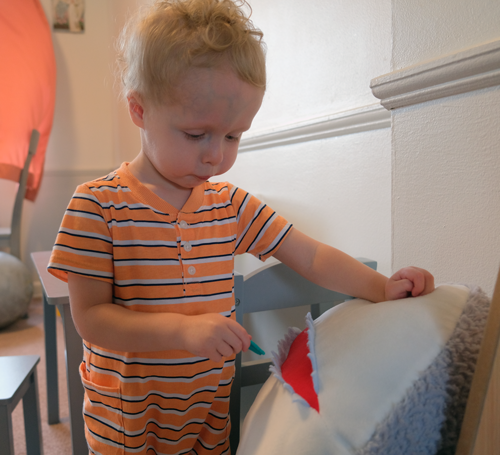- Fax- 740-322-6990
- 740-349-6588
- 800-325-2848
Spreading awareness about 22q

Advocacy beyond Licking County
June 16, 2023
‘He loves life’
July 7, 2023Brantlee Grumm loves to sing, visit the Columbus Zoo and play outside. He’s a big fan of Peppa Pig, his beagle Brutus and kicking his soccer ball.
It’s important to his parents — Krystal and Brandon Grumm — that people get to know their 2.5-year-old and hear his story.
Brantlee, and his older brother Braydon — who passed away in 2019 — were both diagnosed with Chromosome 22q11.2 deletion syndrome, also called DiGeorge syndrome.
Known as 22q, the syndrome is the second most common cause of developmental delay and major congenital heart disease after Down syndrome. But many people have never heard of it, Krystal said.
“We didn’t know about it until our first son was born,” she said. “Because of him we like to spread awareness.”
22q can affect any system in the body. Although every person with the disorder is unique, it typically impacts the heart and immune system as well as speech and behavior.
Braydon was severely affected by the disease and spent the entire 14 months of his life at Children’s Hospital.
Brantlee was diagnosed two weeks after he was born and was found to have several heart defects and developmental delays.
Krystal, who works for Newark City Schools as an educational aide at Flying Colors Public Preschool, was familiar with how LCBDD’s Early Intervention (EI) program supports children with delays and their families.
So when Brantlee was 2-months old, he began receiving EI services with Occupational Therapist Karlie Fleak.
Because it was during the COVID-19 pandemic, their first visits were over Zoom. But once they were able to meet in-person, things really started to click for Brantlee.
Their first priority was helping him eat comfortably with a bottle. With support from Physical Therapist Annie Green and Speech Therapist Janelle Pickens, they worked on crawling, standing, walking and speech.
As he got older, Karlie began working with the Grumms to identify a “sensory diet” for Brantlee that focuses on tumbling, climbing and keeping him on the move and Annie helped support them through the process of getting him fitted for SMO orthotics for his weak ankles.
“We have seen a huge improvement in his speech, he’s talking a lot, walking, putting words together and getting ready to start preschool,” Krystal said. “I really love that (EI) helps the kids transition to preschool.”
Children’s Hospital has a 22q clinic, so their family has access to resources and support and they’ve had the opportunity to talk with other families with the diagnosis from around the state on social media.
With all of Brantlee’s appointments in Columbus, Krystal said they appreciate that Early Intervention is provided in the home, at no cost to families.
The therapists’ tips for how to help Brantlee learn new skills have been very focused on things they can do in their apartment or out in their neighborhood — such as using their couch cushions to help him climb steps.
Brantlee will start preschool at Flying Colors — where his mom works — at the end of the summer.
His Early Intervention Service Coordinator Jennifer Darr has been meeting with their family for several months to make sure all referrals, evaluations and meetings are in place so the transition goes smoothly and the Grumms know what to expect. That support is another aspect of EI that LCBDD provides to families.
Krystal said she’s looking forward to watching Brantlee continue to learn at school and keep up with his peers.
“It’s all thanks to (Early Intervention),” she said. “He wouldn’t be able to do this without that.”
Early intervention (also known as EI) is a statewide program for infants and toddlers — birth to age 3 — with developmental delays, disabilities or medical conditions likely to result in delays. Anyone can make a referral to the program, which is offered to families at no cost.For more information about Early Intervention in Licking County, go to https://lcountydd.org/birth-to-3/. To make an EI referral, please call 1-800-755-4769. You can also make a secure online referral at http://bit.ly/ReferToHMG.







